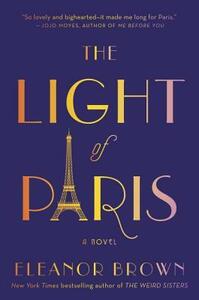Take a photo of a barcode or cover
I loved Eleanor Brown's debut, The Weird Sisters, and it has stuck with me in the years since. I was excited to see that she was releasing a new book. However, this book was quite different from that debut. I enjoyed the parallel stories of a grandmother and granddaughter discovering and rediscovering themselves and their places in the world. Paris is a jewel glittering in the lamplight and provided a sense of escapism. However, I was not quite as captivated as I wanted to be. Brown enjoys the work of JoJo Moyes and this book feels like more in that vein - there is less bite than in her debut - but it is still a winning summer read. 3.5 stars rounded up to 5.
I received an ARC from NetGalley in exchange for an honest review.
I received an ARC from NetGalley in exchange for an honest review.
It's really a basic story about breaking free from expectations, and the desire to fit in... a subject used a lot, and in my case mostly avoided, but it was written so easy and engaging, I really didn't want to stop after reading the first page. My interest stayed till the very end, and to be honest, I loved it...
#TheLiteraryCrew Buddy Read on Litsy - September 2020
Long-time readers know I struggle with women’s fiction. This is through no fault of the authors. I just have issues with the stories in general. Knowing how everyone raved about Ms. Brown’s first novel, I had high hopes for The Light of Paris. Unfortunately for me, it contains everything I do not enjoy in women’s fiction.
This is not to say I did not enjoy the novel. There are parts of it that are enjoyable. The descriptions are Paris are entrancing; Ms. Brown makes even the most mundane experiences sound like an adventure. Watching Margie grow her wings and experience life for the first time is a true pleasure. Margie has a joie de vivre while there that only adds to the city’s charm. Oh to have been alive and young and in Paris during the 1920s!
The vibrancy of the Paris scenes contrast so severely from the modern scenes and the joy and sense of freedom you experience while reading about Paris disappear once the narration switches back to Madeleine. There is something about Madeleine’s constant inner monologue of excuses and justifications that quickly grows old, as does the nonstop questioning of her purpose in life. She is so defeatist; at one point in time, her mother accuses her of standing in her own way of happiness. The truth of this statement never really dawns on Madeleine. She interprets it as her mother means it – that she never gave her current life a chance. However, the opposite is true. She let others steamroll her into a box of a life that fit her no better than the proverbial square peg in a round hole and was conscious of it happening to her the entire time.
Therein lies my greatest problem with The Light of Paris and novels like it. I like my heroines to have a little more backbone and fight in them. Margie has some when she makes the decision to stay in Paris against her parents’ wishes but quickly loses that backbone when life takes an ill turn. Madeleine only gets a backbone upon reading her grandmother’s notebooks. One is left to wonder if she would have done anything different in her life had she never discovered them.
I know this is an unfair assessment. I do not like the happily ever after endings in such novels, but neither do I like characters – especially female ones – who are weak and easily controlled by others. The former is not realistic, but the latter is too realistic. Still, I like what I like, and I dislike what I dislike. In this case, the two things that bother me in fiction ended up in one book.
The Light of Paris is going to be one of those books that will encourage a love of Paris and help readers reassess their own lives. This is an important point. In Margie and Madeleine, readers can easily see themselves. Moreover, the two characters provide the inspiration for anyone to reflect on one’s dreams and passions and evaluate whether they can incorporate those dreams back into their lives. I really struggled to get past the somewhat formulaic plot and the annoying (to me) characters, but I just know that The Light of Paris is going to be a hot book this summer.
This is not to say I did not enjoy the novel. There are parts of it that are enjoyable. The descriptions are Paris are entrancing; Ms. Brown makes even the most mundane experiences sound like an adventure. Watching Margie grow her wings and experience life for the first time is a true pleasure. Margie has a joie de vivre while there that only adds to the city’s charm. Oh to have been alive and young and in Paris during the 1920s!
The vibrancy of the Paris scenes contrast so severely from the modern scenes and the joy and sense of freedom you experience while reading about Paris disappear once the narration switches back to Madeleine. There is something about Madeleine’s constant inner monologue of excuses and justifications that quickly grows old, as does the nonstop questioning of her purpose in life. She is so defeatist; at one point in time, her mother accuses her of standing in her own way of happiness. The truth of this statement never really dawns on Madeleine. She interprets it as her mother means it – that she never gave her current life a chance. However, the opposite is true. She let others steamroll her into a box of a life that fit her no better than the proverbial square peg in a round hole and was conscious of it happening to her the entire time.
Therein lies my greatest problem with The Light of Paris and novels like it. I like my heroines to have a little more backbone and fight in them. Margie has some when she makes the decision to stay in Paris against her parents’ wishes but quickly loses that backbone when life takes an ill turn. Madeleine only gets a backbone upon reading her grandmother’s notebooks. One is left to wonder if she would have done anything different in her life had she never discovered them.
I know this is an unfair assessment. I do not like the happily ever after endings in such novels, but neither do I like characters – especially female ones – who are weak and easily controlled by others. The former is not realistic, but the latter is too realistic. Still, I like what I like, and I dislike what I dislike. In this case, the two things that bother me in fiction ended up in one book.
The Light of Paris is going to be one of those books that will encourage a love of Paris and help readers reassess their own lives. This is an important point. In Margie and Madeleine, readers can easily see themselves. Moreover, the two characters provide the inspiration for anyone to reflect on one’s dreams and passions and evaluate whether they can incorporate those dreams back into their lives. I really struggled to get past the somewhat formulaic plot and the annoying (to me) characters, but I just know that The Light of Paris is going to be a hot book this summer.
A really beautifully written story of two women discovering themselves.. a nice, light summer read.
How can this possible be written by the same author who wrote The Weird Sisters? There are no similarities whatsoever! I loved The Weird Sisters but could find nothing redeeming about this book. Are there really people like the main characters in this book? If so, I've never met them. Many of my family members (myself included) and friends attended private schools, made debuts, had fashionable weddings, served on volunteer committees, etc.; but not a single one of them ever acted like the characters in this book. None are wimpy like the main character - quite the opposite.
hopeful
inspiring
lighthearted
reflective
medium-paced
Strong character development:
Yes
Loveable characters:
Yes
Diverse cast of characters:
No
Flaws of characters a main focus:
Yes
Although I enjoyed the book, I found myself more interested in Madeleine's side of the story than Margie. Honestly, I didn't like Margie. It was more I didn't like how she was written than her as a character.
Like I said though, I did enjoy the book, it was well written, but didn't have enough of the Paris parts. I think that would have made me like it a little more. Enjoyable book though!
Like I said though, I did enjoy the book, it was well written, but didn't have enough of the Paris parts. I think that would have made me like it a little more. Enjoyable book though!






